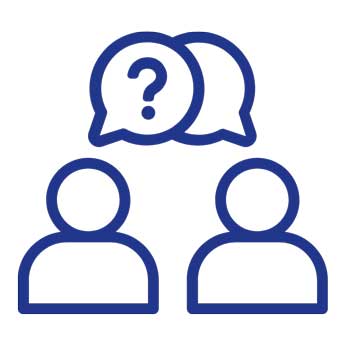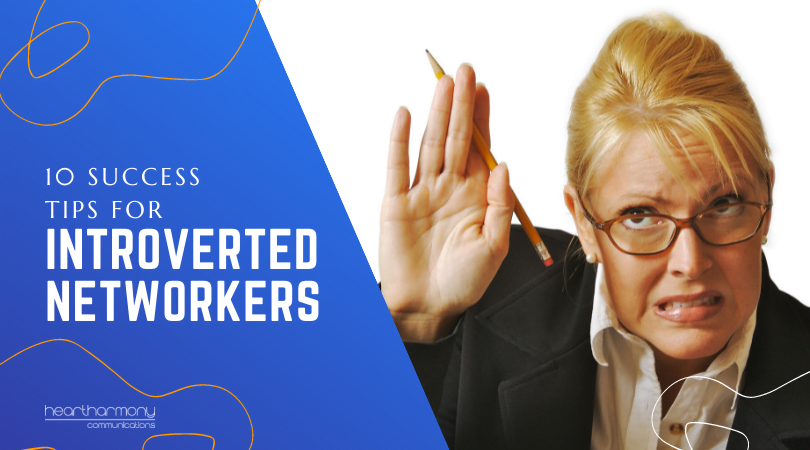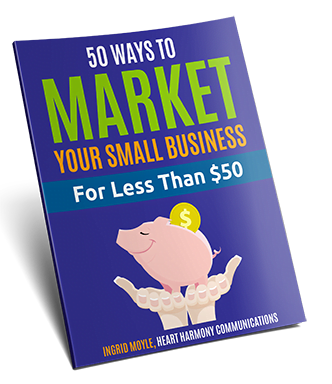Are you an introvert and struggle with how to network effectively? Here’s some practical tips to help boost your networking effectiveness.
Hands up who gleefully adores going to networking events? Most people don’t know that I am a raging introvert (who pretends to be an extrovert). Getting me to a networking event takes an awful lot of warm and encouraging positive self-talk before I hit the “book” button. This is followed by clearing my diary for the rest of the day after the event to regain the energy that it takes me to be social and “on” during an event.
I think of networking in the same way that I think of kale smoothies: Good for me but oh so challenging to consume.
If you are a fellow introverted networker, then read on.
What if I told you that the skills you need to become great at networking if you are a raging introvert are the same skills you need to market your business?
What if I told you that if you master these ten things, you will be well on the way to success in both (… and that networking and marketing would actually begin to become vaguely pleasurable)?
Interested?
My Tips for Introverted Networkers
1 ) Turn Up!
People are looking for you and your business. Unless they can see you, they cannot connect with you.
There’s no point sticking a logo on your website, “Member of XYZ Organisation, Brisbane Chapter” if you never actually show up to meetings. A logo never converts anyone into a buyer.
You need to physically turn up to meetings as the best connections come from face-to-face meetings. While I adore the online world and think every business needs and deserves an amazing online presence, you can’t beat human contact.
2) Be Consistent Without Being Creepy
If you are part of a networking group, make sure you consistently turn up to the group. People often need to see you more than once to be comfortable talking with you, hire you or refer business to you. A one-off shot doesn’t cut it.
My record was turning up every month to one organisation’s meetings for three whole years before one of the members finally became a client. Then, over the next six months, 92% of the members became my clients. (The other 8% were competing marketing companies). Persistence pays off!
However, if you turn up to every single event, at every single networking group in your larger geographic region, you start to look as if you never actually do any work (and begin to look like a creepy stalker dude that is always right behind someone whenever they turn around).
Pick the groups and events that resonate the most with you, and then become a regular at just that select handful of events.
Download our free ebook: 50 Ways to Market Your Business for Less than $50 for more great ideas!

3) Listen And Ask Questions To Find Out More About Others
Being an introverted networker means you really have an unfair superpower. You are exceptional at listening. Being truly heard is one of the most valuable gifts you can give someone. Be present – listen and find out more about the person you are talking to.
At networking events, crank your superpower: Listen more than you talk and ask questions from a space of genuine interest in finding out more about the person and their business.
Become a collector of great icebreaker questions, and if all else fails, simply ask the person to tell you more about their business and what made them start it. Tapping into someone’s “why” is a brilliant conversation starter.
What can you ask? Here are a couple of networking icebreaker questions to get you started:
- What is the best thing about your business?
- What was the most effective marketing tactic you tried last year?
- Tell me about your top business success last year.
- Why did you get into <type of business>?
- What’s the best bit of business advice you have been given?
- What was the worst client you ever had?
- What business book would you recommend?
- What’s the hardest thing you have had to do with your business?
- If you could have one wish granted for your business, what would it be?
- Who has inspired you as a business owner?
- If you were starting your business over again, what would you do differently?
- What do you do to relax from work?
4) Introduce Other People
Many people struggle at networking and are fiercely grateful when other people help break the ice.
Adopt the role of greeter or introducer. Spend the session introducing people to the other people there by sharing a little bit about what you have learned about them and their business to help spark conversation.
By learning about the other person and their business, and then introducing them to others who can help that person succeed, people are ecstatically grateful towards you, and you feel like you have a useful task to do (which gets you over shyness).
5) Be Authentic
Something happens when we are fully ourselves and share our real warts and all stories: It gives permission for other people to be real in return.
When we drop the holier than thou mask, and the pretence that we are ever-so-successful-at-everything, we end up connecting at a much deeper level.
If you are an unabashed geek – say so. If you are feeling a bit nervous – say so.
Being authentic is branding rocket fuel as you give people you meet permission to also be truly themselves.
6) Be Clear Telling People What You Do
At most networking events, people share their 2-minute elevator speech.
The trouble is that after some speeches people are left nodding as solemnly as one of those head-bobbing toy dogs in the back of a car (and have no clue about what you ACTUALLY do and how it could benefit them).
If they don’t understand you, they can’t help you or refer business your way. If your speech does not result in people coming up to chat with you after the meeting, then you need to tweak your talk.
Our three step copywriting master formula also works brilliantly with elevator speeches. An elevator speech summarises what you do, how you do it and how you know you are good at it in just a few sentences.
7) Be Clear About Your Ideal Client
Many networking sessions ask you to explain your ideal referral to help people know who to send your way. Saying, “Any person with a pulse,” does not qualify.
Be clear exactly who your ideal clients are, and weave this information into your discussion and stories about your business. If your ideal clients are tradies, share a case study where you talk about what a typical tradie client experienced working with you, or fears that many tradies may have before hiring someone like you.
8) Make It Easy For People To Follow Up
If you connect at a networking event, then a common way to arrange a follow up is to share your business cards.
Before your next event, look over your business cards. Do they “feel” solid
Make sure your phone number, website and other contact details are prominently displayed. I have seen business cards with no phone numbers or web addresses – as well as cards with incorrect numbers and misspelled
9) Follow Up And Follow Through
After the event, jot on the back of the cards you have collected where you met the person, the date, if they consented to join your mailing list and if you promised to send them anything.
If you promise to send something to someone, make sure you send it through within 24 hours after the event. Getting a lead is only useful if you take action on it.
That said, unless someone has explicitly stated that they want to join your mailing list, adding their details from a business card they gave you at a networking event is not only illegal and against the Spam Act, it is also simply rude and deserves all the abuse that will be heaped on your head in CAPITAL LETTERS for doing it.
10) Quality Is More Important Than Quantity
Networking is not speed dating or a competition to collect cards with the winner declared as the person with the most cards at the end of the event.
Forming a deep connection with one or two people at an event is more useful
By slowing down and not having to race to push for a sale, you become memorable for all the right reasons.
If you try to sell to individual people directly at a networking event, you may as well not bother turning up. Networking delivers maximum results from long-term connections, and establishing credibility and trust. Quality trumps quantity every time.
One Last Tip – Network to Form Alliances
Alliances are the some of the most effective business referral strategies. The best use of networking events is to look to connect with people at networking events who provide goods or services to a similar client base to yourself.
Go for a coffee after the meeting to get to know them deeper, and then work together to build both of your businesses. That is the ultimate reason to attend networking events: To find fantastic alliance partners!





